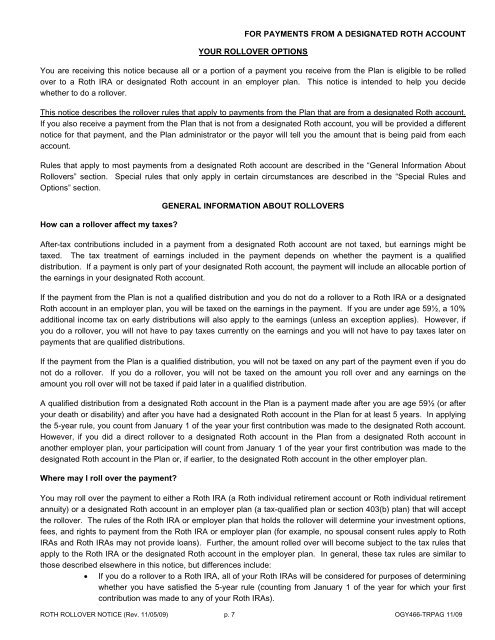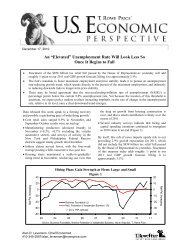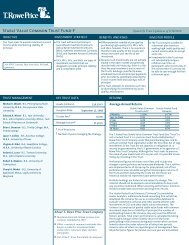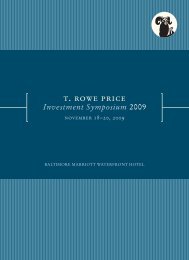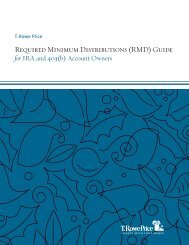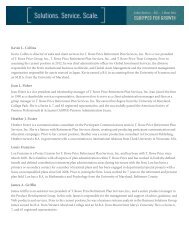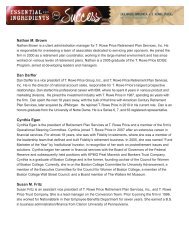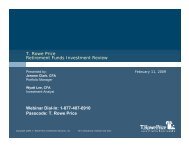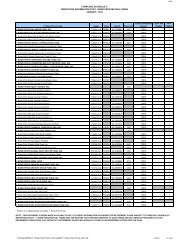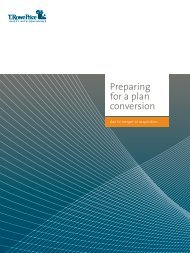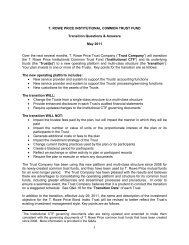YOUR ROLLOVER OPTIONS You are receiving this notice because ...
YOUR ROLLOVER OPTIONS You are receiving this notice because ...
YOUR ROLLOVER OPTIONS You are receiving this notice because ...
- No tags were found...
Create successful ePaper yourself
Turn your PDF publications into a flip-book with our unique Google optimized e-Paper software.
FOR PAYMENTS FROM A DESIGNATED ROTH ACCOUNT<br />
<strong>YOUR</strong> <strong>ROLLOVER</strong> <strong>OPTIONS</strong><br />
<strong>You</strong> <strong>are</strong> <strong>receiving</strong> <strong>this</strong> <strong>notice</strong> <strong>because</strong> all or a portion of a payment you receive from the Plan is eligible to be rolled<br />
over to a Roth IRA or designated Roth account in an employer plan. This <strong>notice</strong> is intended to help you decide<br />
whether to do a rollover.<br />
This <strong>notice</strong> describes the rollover rules that apply to payments from the Plan that <strong>are</strong> from a designated Roth account.<br />
If you also receive a payment from the Plan that is not from a designated Roth account, you will be provided a different<br />
<strong>notice</strong> for that payment, and the Plan administrator or the payor will tell you the amount that is being paid from each<br />
account.<br />
Rules that apply to most payments from a designated Roth account <strong>are</strong> described in the “General Information About<br />
Rollovers” section. Special rules that only apply in certain circumstances <strong>are</strong> described in the “Special Rules and<br />
Options” section.<br />
How can a rollover affect my taxes?<br />
GENERAL INFORMATION ABOUT <strong>ROLLOVER</strong>S<br />
After-tax contributions included in a payment from a designated Roth account <strong>are</strong> not taxed, but earnings might be<br />
taxed. The tax treatment of earnings included in the payment depends on whether the payment is a qualified<br />
distribution. If a payment is only part of your designated Roth account, the payment will include an allocable portion of<br />
the earnings in your designated Roth account.<br />
If the payment from the Plan is not a qualified distribution and you do not do a rollover to a Roth IRA or a designated<br />
Roth account in an employer plan, you will be taxed on the earnings in the payment. If you <strong>are</strong> under age 59½, a 10%<br />
additional income tax on early distributions will also apply to the earnings (unless an exception applies). However, if<br />
you do a rollover, you will not have to pay taxes currently on the earnings and you will not have to pay taxes later on<br />
payments that <strong>are</strong> qualified distributions.<br />
If the payment from the Plan is a qualified distribution, you will not be taxed on any part of the payment even if you do<br />
not do a rollover. If you do a rollover, you will not be taxed on the amount you roll over and any earnings on the<br />
amount you roll over will not be taxed if paid later in a qualified distribution.<br />
A qualified distribution from a designated Roth account in the Plan is a payment made after you <strong>are</strong> age 59½ (or after<br />
your death or disability) and after you have had a designated Roth account in the Plan for at least 5 years. In applying<br />
the 5-year rule, you count from January 1 of the year your first contribution was made to the designated Roth account.<br />
However, if you did a direct rollover to a designated Roth account in the Plan from a designated Roth account in<br />
another employer plan, your participation will count from January 1 of the year your first contribution was made to the<br />
designated Roth account in the Plan or, if earlier, to the designated Roth account in the other employer plan.<br />
Where may I roll over the payment?<br />
<strong>You</strong> may roll over the payment to either a Roth IRA (a Roth individual retirement account or Roth individual retirement<br />
annuity) or a designated Roth account in an employer plan (a tax-qualified plan or section 403(b) plan) that will accept<br />
the rollover. The rules of the Roth IRA or employer plan that holds the rollover will determine your investment options,<br />
fees, and rights to payment from the Roth IRA or employer plan (for example, no spousal consent rules apply to Roth<br />
IRAs and Roth IRAs may not provide loans). Further, the amount rolled over will become subject to the tax rules that<br />
apply to the Roth IRA or the designated Roth account in the employer plan. In general, these tax rules <strong>are</strong> similar to<br />
those described elsewhere in <strong>this</strong> <strong>notice</strong>, but differences include:<br />
• If you do a rollover to a Roth IRA, all of your Roth IRAs will be considered for purposes of determining<br />
whether you have satisfied the 5-year rule (counting from January 1 of the year for which your first<br />
contribution was made to any of your Roth IRAs).<br />
ROTH <strong>ROLLOVER</strong> NOTICE (Rev. 11/05/09) p. 7 OGY466-TRPAG 11/09


